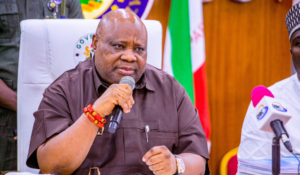
Iran’s Supreme Leader Ayatollah Ali Khamenei on Friday warned that a “harsh retaliation is waiting” for the U.S. after an airstrike on an airport in Baghdad killed Iranian Gen. Qassem Soleimani, the head of Iran’s elite Quds Force.
The Iranian state TV carried a statement by Khamenei who also called Soleimani “the international face of resistance.” Khamenei declared three days of public mourning for the general’s death.
The Iranian foreign minister warned that the U.S. would bear all the consequences of the “foolish” military attack, claiming Soleimani’s assassination would only escalate tensions in the region given that he was “THE most effective force” fighting terrorism carried out by the Islamic State.
Javad Zarif, the foreign minister of Islamic Republic of Iran, said on Twitter that “The US’ act of international terrorism, targeting & assassinating General Soleimani—THE most effective force fighting Daesh (ISIS), Al Nusrah, Al Qaeda et al—is extremely dangerous & a foolish escalation.”
The US’ act of international terrorism, targeting & assassinating General Soleimani—THE most effective force fighting Daesh (ISIS), Al Nusrah, Al Qaeda et al—is extremely dangerous & a foolish escalation.
Zarif references three affiliated Sunni Muslim extremist groups who’ve held territory in Iraq and Syria. The modern Islamic State of Iraq and the Levant (ISIL) has ties that date back to the rise of al Qaeda in 2004 after the U.S. invaded Iraq the year before.
The Pentagon confirmed that President Trump ordered the early Friday-morning attack that killed Soleimani, the head of the Islamic Revolutionary Guard Corps’ elite Quds Force, among other military officials at Baghdad International Airport. The airstrike hit in Iraq.
Many Democrats admitted that no Americans would mourn Soleimani’s death but also raised concern that the escalation will put the U.S. on a crash course for a new conflict in the Mideast. House Speaker Nancy Pelosi released a statement saying that Trump ordered the airstrike “without the consultation of Congress.”
“American leaders’ highest priority is to protect American lives and interests,” her statement said. “But we cannot put the lives of American service members, diplomats, and others further at risk by engaging in provocative and disproportionate actions. Tonight’s airstrike risks provoking further dangerous escalation of violence.”
An adviser to Iran’s President Hassan Rouhani also quickly warned Trump of retaliation from Tehran.
“Trump through his gamble has dragged the U.S. into the most dangerous situation in the region,” Hessameddin Ashena wrote on the social media app Telegram. “Whoever put his foot beyond the red line should be ready to face its consequences.”
Soleimani is the military mastermind whom Secretary of State Mike Pompeo had deemed equally as dangerous as Islamic State leader Abu Bakr al-Baghdadi. In October, Baghdadi killed himself during a U.S. raid on a compound in northwest Syria, seven months after the so-called ISIS “caliphate” crumbled as the terrorist group lost its final swath of Syrian territory in March.
The overnight attack occurred amid tensions with the U.S. after an Iran-backed militia attacked the U.S. Embassy in Baghdad, which was targeted Tuesday by angry mobs who were protesting recent U.S. airstrikes. The two-day siege outside of the U.S. Embassy in Baghdad came to an end Wednesday afternoon after dozens of pro-Iran militiamen and their supporters withdrew from the compound.
Soleimani was the long-running leader of the elite intelligence wing called Quds Force – which itself has been a designated terror group since 2007, and is estimated to be 20,000 strong. Considered one of the most powerful men in Iran, he routinely was referred to as its “shadow commander” or “spymaster.”
In April 2019, the State Department announced Iran was responsible for killing 608 U.S. troops during the Iraq War. Soleimani was the head of the Iranian and Iranian-backed forces carrying out those operations killing American troops. According to the State Department, 17 percent of all deaths of U.S. personnel in Iraq from 2003 to 2011 were orchestrated by Soleimani.
As recently as 2015, a travel ban and United Nations Security Council resolutions had barred Soleimani from leaving Iran.
Friday’s Baghdad strike also killed Abu Mahdi al-Muhandis, the deputy commander of Iran-backed militias known as the Popular Mobilization Forces, a source told Fox News. In all, at least seven people were killed and at least three rockets were fired, officials told The Associated Press. An official with the Popular Mobilization Forces said its airport protocol officer, Mohammed Reda, also died.





